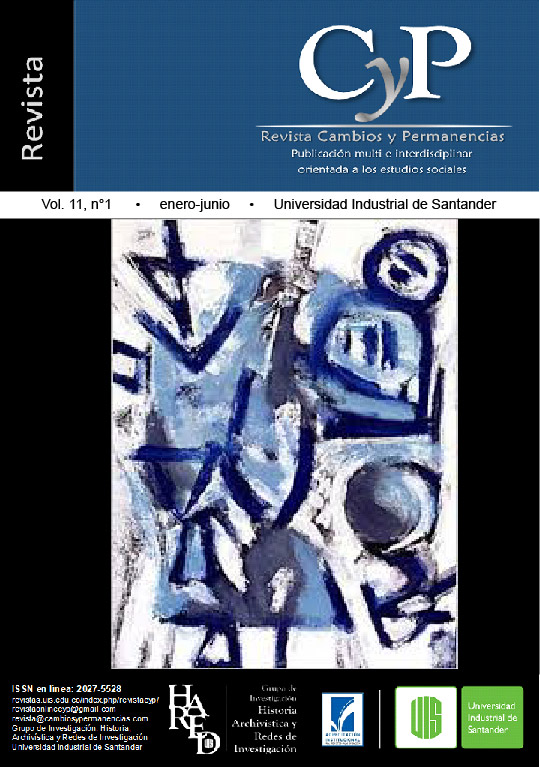Recovery of historical memory: the case of Qaralamaxat Qarma ’-Etaxat, its importance in the mothering practices of the Mothers Carers of the Qom Culture of Pampa del Indio.
Published 2020-06-30
Keywords
- Memory,
- History,
- Indigenous People,
- Interculturality,
- MCCQ
How to Cite
Abstract
The work communicates the contribution of oral history in the reconstruction of the places or territories ancestrally inhabited by the Qom community of Pampa del Indio and the importance that it acquires for teaching from an intercultural perspective. From an intercultural -philosophical-historical perspective, the oral history workshop methodology used made it easier to work with some action research and hermeneutic analysis strategies. From the registration made by the MCCQ the toponyms or ancestral places have been incorporated into the written history, without losing the oral transmission of their stories in the bilingual Qom-Spanish modality. In this sense, the qom toponyms, preserved by the story, interweave with other stories the fabric of oral history. The “toponymy” or “ancestral places” as the Qom prefer to call them, acquire pedagogical value for the Mother Caretakers of the Qom Culture: The narration of the ancestral places recovers the past and preserves the history of the community. Qaralamaxat Qarma '-Etaxat –Our places, territory and water environments-, represent a process of construction of objective history, in which the activation of memory worked in the reconstruction of the history of the community, from within with its own sources and witnesses.
Downloads
References
Carrió. N. M., y Serra, P. (1996). Valor geográfico de los topónimos y una propuesta para su clasificación. Investigaciones y Ensayos Geográficos. Año IV, Nº IV, 65-75.
De La Cruz, L. (1993). Apuntes para una topología del espacio Toba. Suplemento Antropológico. Revista del Centro de Estudios Antropológicos. Vol. XXVIII, (1-2).
Fornet-Betancourt, R. (2003). Interculturalidad y Filosofía en América Latina. Aachen, Alemania: Wissenschaftsverlag Mainz.
Fornet-Betancourt, R. (2009). Tareas y propuestas de la Filosofía Intercultural. Aachen, Alemania: Wissenschaftsverlag Mainz.
Geertz, C. (1994). Primera Parte. Hallado en traducción: sobre la historia social de la imaginación moral Conocimiento local. Ensayos sobre la interpretación de las culturas. Barcelona, España. Paidos.
Gili, M. L. (2010). La historia oral y la memoria colectiva como herramientas para el registro del pasado. Tefros, (8).
Ipiña Melgar, E. (1997). Condiciones y perfil del docente de educación intercultural bilingüe. Revista Iberoamericana de Educación Bilingüe Intercultural. Organización de Estados Iberoamericanos, (13), 99-109. Recuperado de http://rieoei.org/oeivirt/rie13.htm
Madres Cuidadoras de la Cultura Qom. (2010). Qaralamaxat Qarma’. Nuestros Lugares. Córdoba: Argentina: Copiar.
Rémond, R. (2007). La Transmisión de la memoria. En La memoria contra el olvido. ¿Por qué Recordar? (pp. M,69-72). Buenos Aires, Argentina: Academia Universal de las Culturas-Granica.
Ricoeur, P. (2008). Esbozo fenomenológico de la memoria. En La memoria, la historia, el olvido (pp.40-66). Buenos Aires, Argentina: FCE.
Salas Astrain, R. (2006). Aportes hermenéuticos a una perspectiva latinoamericana de la justicia. Sobre el debate entre la ética de la liberación y la ética intercultural. Veritas, (15), 313-328. Recuperado de: www.dialnet.unirioja.es.
Sandoval, Madres Cuidadoras de la Cultura Qom, et. al. (2013) Memoria y territorio vivido. Ntounaqchec, Qaralamaxat Qarma. Los relatos dejan ver el mundo natural y cultural de los Qom. En Experiencias en Educación Bilingüe Intercultural con las Madres Cuidadoras de la Cultura Qom (pp. 51-65). (S. L.): Resistencia, Contexto.
Sandoval, S. E. (2018). Reconstrucción de la memoria histórica de la comunidad qom de Pampa del Indio. Enfoque Intercultural (Tesis doctoral) Doctorado en Filosofía. Facultad de Humanidades, Universidad Nacional del Nordeste.
Sandoval. S., MCCQ., et al. (2018). Qailon, Celebración del cambio de nombre en la joven qom. Qailon, Celebración del cambio de nombre en la joven Qom. (S. L.): EUDENE. Recuperado de http://hum.unne.edu.ar/investigacion/inicial/mccq/produccion.htm
Silva, M. (2007). Memorias del Gran Chaco 2ª. Parte. (1900-1997). Córdoba, Argentina: Julio Rojas.
Entrevistas
Silvestre, A. (septiembre de 2010) Entrevistada por S. E. Sandoval. Realizada en la localidad de Pampa del Indio, provincia del Chaco.
Silvestre, J. (septiembre de 2008). Entrevistada por S. E. Sandoval. Realizada en la localidad de Pampa del Indio, provincia del Chaco.

